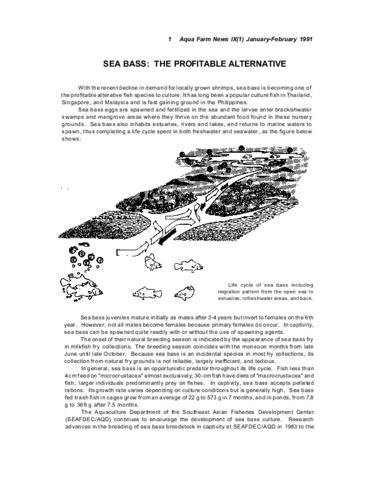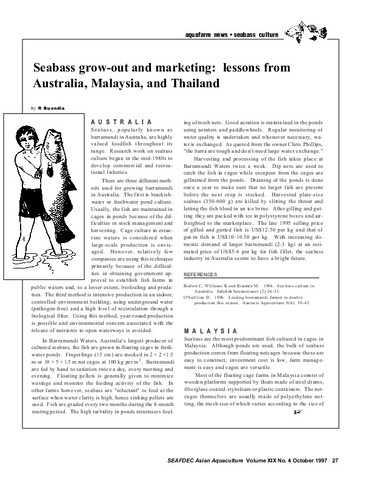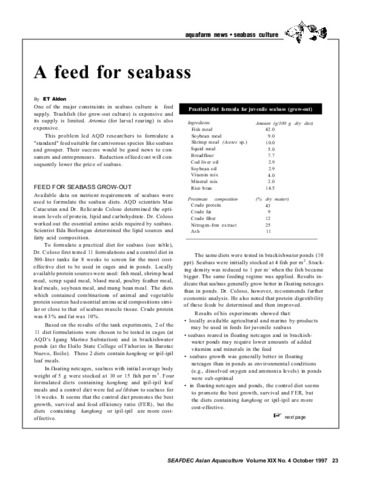Requirements of juvenile sea bass, Lates calcarifer Bloch, for lysine and arginine
- Global styles
- MLA
- Vancouver
- Elsevier - Harvard
- APA
- Help

View/
Date
1993Page views
2,631ASFA keyword
AGROVOC keyword
Taxonomic term
Metadata
Show full item record
Share
Abstract
The dietary requirements of juvenile sea bass for the essential amino acids, lysine and arginine, were studied. Fish (Initial average weight in Lysine (Study 1) and Arginine (Study 2) experiments were 13.1 g and 2.5 g, respectively) were given amino acid test diets that contained fish meal, zein, squid meal, and crystalline amino acids (about 46% dietary protein) for 12 weeks. Each set of nitrogenous and isocaloric test diets contained graded levels of lysine or arginine. Fish were fed twice a day at 0800 and 1600 h: in Study 1, feeding rate was 4-2.5% of body weight per day throughout the experiment, while in Study 2, fish were fed at a rate of 10% body wt per day during the first four weeks and at 4% body wt per day from 5 to 12 weeks thereafter. The fish were reared in 500 li (Study 1) or 250 li (Study 2) fiberglass tanks provided with flowthrough seawater at 28°C and salinity of 30 ppt. At the end of the feeding experiment, growth, survival, and feed efficiency were determined. Survival was high in fish given adequate lysine or arginine. Mean weight gains were significantly different in fish fed varying levels of lysine or arginine but no significant different in fish fed varying levels of lysine or arginine but no significant differences were found in the hepatosomatic index (HSI), survival, and feed efficiently ratio. From the breakpoint analysis of the growth response curves, the dietary requirements of sea bass juveniles for lysine and arginine are 4.5 and 3.6% of dietary protein, respectively. This information is important in developing research diets and practical feeds for sea bass.
Suggested Citation
Coloso, R. M., Murillo, D. P., Borlongan, I. G., & Catacutan, M. R. (1993). Requirements of juvenile sea bass, Lates calcarifer Bloch, for lysine and arginine. In Towards More Effective Utilization of Resources for Sustained Development. Proceedings of the First IFS-NRCP Seminar-Workshop, 26-29 April 1993, Makati, Metro Manila, Philippines (pp. 256-262). Stockholm, Sweden: International Foundation for Science.
Type
Conference paperCollections
- Conference Proceedings [300]
Related items
Showing items related by title, author, creator and subject.
-
Sea bass: The profitable alternative
Southeast Asian Fisheries Development Center, Aquaculture Department (Aquaculture Department, Southeast Asian Fisheries Development Center, 1991) -
Seabass grow-out and marketing: lessons from Australia, Malaysia, and Thailand
Buendia, Romeo (Aquaculture Department, Southeast Asian Fisheries Development Center, 1997) -
A feed for seabass
Aldon, E. T. (Aquaculture Department, Southeast Asian Fisheries Development Center, 1997)One of the major constraints in seabass (Lates calcarifer) culture is feed supply. Details are given of work conducted at AQD regarding the formulation of a 'standard' feed suitable for carnivorous species like the seabass ...





